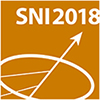Speaker
Description
Proton conducting oxides are currently receiving considerable attention for their use as electrolytes in solid oxide fuel cells. One of the main challenges for these devices is to combine the advantages of a solid electrolyte with those of operational temperatures below 750 $^\circ$C, which is currently hampered by insufficient conductivities in the targeted T-range. The development of new electrolytes meeting the requirements for applications depends on a better understanding of the proton conduction mechanism. To this aim, systematic QENS investigations over a wide Q-E range were conducted on hydrated acceptor-doped barium zirconates, with focus onto the effect of the type and concentration of dopant atoms on the atomic-scale proton dynamics.
The results show complex dynamics, arising from a distribution of different proton sites. At ps time scale, localized displacements interpretable as proton jumps and reorientations of the hydroxyl groups are disclosed. Faster motions are observed for the more distorted structures associated with higher doping levels. The analysis of the dynamics at longer time scales reveals long-range proton diffusion which can be described as a Chudley-Elliot jump-diffusion process. Higher doping concentrations lead to higher activation energies, but larger fractions of mobile protons. This new insight can be useful for the design of improved proton conductors for technological applications.

